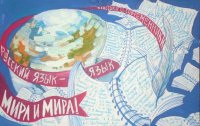 Every year on February 21, the world celebrates International Mother Language Day.
Every year on February 21, the world celebrates International Mother Language Day.International Mother Language Day was established at the UNESCO General Conference in 1999 and has been celebrated worldwide since 2000 to promote linguistic and cultural diversity and multilingualism.
The native language is an expression of self-consciousness and the connection of generations. It is closely connected with the history of the ethnos, ensures its unity and becomes a guarantee of its originality: it forms an inextricable link between its bearers and serves as the basis for the people. Languages contain a body of acquired knowledge. So, some of them describe a certain environment in a unique way, for example, the Amazonian jungle, note the properties of medicinal herbs, or contain information on astronomy.
Mother tongue activities contribute not only to linguistic diversity and multilingualism, but also to a better understanding of linguistic and cultural traditions throughout the world. But despite their enormous value, languages around the world continue to disappear. The disappearance of any language means the loss of a particle of the universal heritage.
UNESCO calls on all countries to develop, support and intensify activities aimed at respecting and protecting all languages, and especially those on the verge of extinction.
 Every year, International Mother Language Day is dedicated to a specific theme.
Every year, International Mother Language Day is dedicated to a specific theme.In 2020, the theme of the international day was "Languages without borders", and in 2021 - "Promotion of multilingualism for inclusion in education and society".
In 2022, International Mother Language Day will be dedicated to the theme "Using Technology in Multilingual Learning: Challenges and Opportunities", which will discuss the potential role of technology in promoting multilingual education and supporting the development of quality teaching and learning for all.
UNESCO believes that mother tongue education should start at an early age. This is important in the context of the COVID-19 pandemic, as it is accompanied by the spread of disinformation, making it difficult to find accurate and vital information about it. Information about the pandemic and protection and prevention measures should be available to everyone, including indigenous peoples.
On December 18, 2019, the UN General Assembly proclaimed 2022-2032 as the International Decade of the World's Indigenous Languages in a resolution of December 18, 2019, in order to draw the attention of the world community to the problem of the catastrophic loss of many indigenous languages and to mobilize stakeholders and resources for their preservation, revival and promotion.
Today there are about six thousand languages in the world and 43% of them are endangered.
There are 193 nationalities in Russia, 277 languages and dialects are used. Only in the Russian education system there are more than 100 languages, children are taught in 24 languages, 81 languages are studied as a subject and optional.
According to linguists, 14 languages have disappeared in Russia over the past 150 years. Of these, five are in the post-Soviet period.
More than 60 languages are included in the Red Book of the Languages of the Peoples of Russia.
On October 26, 2018, Russian President Vladimir Putin signed a decree establishing the Foundation for the Preservation and Study of the Native Languages of the Peoples of the Russian Federation. The document was adopted "in order to create conditions for the preservation and study of the native languages of the peoples of the Russian Federation, which are a national treasure and historical and cultural heritage of the Russian state."
In 2020, the All-Russian action "Mother tongues of Russia" was held in the Russian Federation on the occasion of the International Mother Language Day. Schoolchildren from grades 1 to 11 recorded a poem in their native language on video and published it on social networks with the hashtag #NativeLanguages of Russia. More than 15,000 people from 83 regions took part in the action and read poems in more than 82 languages of the peoples of Russia. In 2021, the action "Mother tongues of the peoples of Russia" was also held. Schoolchildren recorded on video a poem in their native language about their parents, their city or village, a historical event and posted videos on Instagram, Vkontakte or TikTok social networks with the hashtag #Rodnyeyazyki2021. All participants received a personalized certificate, and the most interesting works were published on the websites of the Ministry of Education and the Native Languages Foundation.
On February 1, 2022, on the International Mother Language Day, the Foundation for the Preservation and Study of Native Languages of the Peoples of the Russian Federation, together with the All-Russian Children's Center "Eaglet", launched the "Tell a friend about your native language" campaign. Its goal is to draw the attention of the younger generation to the importance of preserving, developing and studying the native languages of the peoples of Russia. Children from "Orlyonok" and children of the Russian network of the "UNESCO Associated Schools" project, who speak their native language, can take part in it. Under the terms of the action, children, native speakers of the peoples of Russia, shoot a short video where they teach their friends greetings, phrases of their native language. They can learn a poem, a story, or sing a song. The guys post videos on social networks with the hashtags #myrodnoyaz
The material was prepared on the basis of information from RIA Novosti and open sources https://ria.ru/20220221/yazyk-1773547548.html


